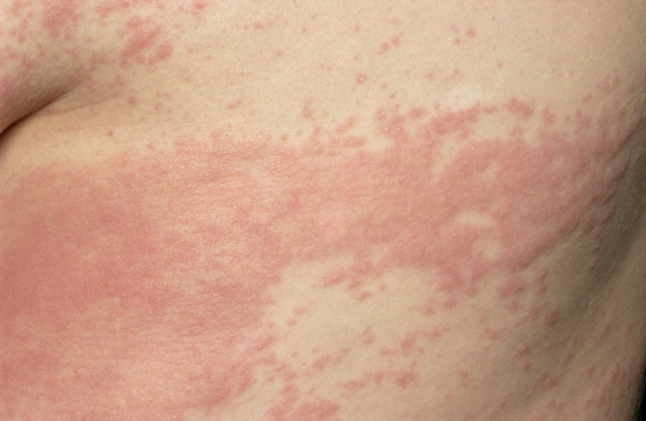-
(a) What is the diagnosis?
Show Answer
This is likely to be urticaria. Urticaria is known as ‘nettle rash’, itchy hives or wheals. It is a temporary eruption of erythema and oedema with swelling of the dermis and is usually itchy. Urticaria presents as itchy erythematous macules and wheals with pink swollen raised areas with a surrounding flare. The wheals usually resolve within 24 hours and may last only a few hours.
-
(b) What types of this condition do you know?
Show Answer
Urticaria can be classified as ordinary urticaria consisting of acute or chronic urticaria. Other types include physical and cholinergic, contact urticaria and immune complex urticaria such as urticarial vasculitis.
-
(c) What investigations will you do?
Show Answer
Investigations in urticaria need to exclude associated conditions with full blood count, ESR and thyroid function. Five per cent of patients with chronic urticaria have abnormal thyroid function. Skin biopsy is needed if urticarial vasculitis is suspected. A food diary may be helpful to try to identify any specific pattern or link. A chart of the frequency and severity of the urticaria on a scale of 0–10 can be useful to monitor any change with treatment.
-
(d) What management is needed?
Show Answer
H1 receptor blockers (anti-histamines) can reduce itch, whealing and erythema. Chlorphenamine has side effects of sedation and anti-cholinergic properties but is useful for night-time sedation and to reduce itching. Second generation H1 anti-histamines are the treatment of choice with low levels of sedation and minimal anti-cholinergic side effects. Regular anti-histamines may need to be used for long periods to have satisfactory control of the urticaria.
-
(e) How long will this condition last?
Show Answer
Urticaria is defined as chronic if lasting >6 weeks. A cause is less likely to be found for chronic rather than acute urticaria. Chronic urticaria can last for many years in some cases.
-
(f) Will oral corticosteroid therapy help this man?
Show Answer
Corticosteroids are effective in patients with severe urticaria and short courses of oral steroids are often prescribed for acute exacerbations. However, prolonged use must be avoided because of the risk of side effects and also instability of the urticaria.


